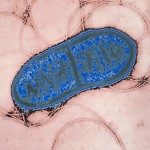Lien vers Pubmed [PMID] – 30905287
Lien vers HAL – hal-02329742
Lien DOI – 10.1098/rstb.2018.0088
Philosophical Transactions of the Royal Society B: Biological Sciences, 2019, 374 (1772), pp.20180088. ⟨10.1098/rstb.2018.0088⟩
The absence of CRISPR-Cas systems in more than half of the sequenced bacterial genomes is intriguing, because their role in adaptive immunity and their frequent transfer between species should have made them almost ubiquitous, as is the case in Archaea. Here, we investigate the possibility that the success of CRISPR-Cas acquisition by horizontal gene transfer is affected by the interactions of these systems with the host genetic background and especially with components of double-strand break repair systems (DSB-RS). We first described the distribution of systems specialized in the repair of double-strand breaks in Bacteria: homologous recombination and non-homologous end joining. This allowed us to show that such systems are more often positively or negatively correlated with the frequency of CRISPR-Cas systems than random genes of similar frequency. The detailed analysis of these co-occurrence patterns shows that our method identifies previously known cases of mechanistic interactions between these systems. It also reveals other positive and negative patterns of co-occurrence between DSB-RS and CRISPR-Cas systems. Notably, it shows that the patterns of distribution of CRISPR-Cas systems in Proteobacteria are strongly dependent on the epistatic groups including RecBCD and AddAB. Our results suggest that the genetic background plays an important role in the success of adaptive immunity in different bacterial clades and provide insights to guide further experimental research on the interactions between CRISPR-Cas and DSB-RS. This article is part of a discussion meeting issue ‘The ecology and evolution of prokaryotic CRISPR-Cas adaptive immune systems’.







